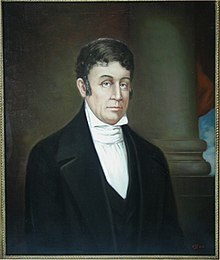Archibald Roane
| Archibald Roane | |
|---|---|

Portrait of Roane by C.J. Fox
|
|
| 2nd Governor of Tennessee | |
|
In office September 23, 1801 – September 23, 1803 |
|
| Preceded by | John Sevier |
| Succeeded by | John Sevier |
| Personal details | |
| Born | 1759 or 1760 Derry Township, Province of Pennsylvania, British America |
| Died |
(aged about 59) Knox County, Tennessee, U.S. |
| Resting place | Pleasant Forest Cemetery Farragut, Tennessee |
| Political party | Democratic-Republican |
| Spouse(s) | Ann Campbell |
| Relations |
Spencer Roane (cousin) John Roane (nephew) |
| Profession | Attorney |
| Religion | Episcopalian |
Archibald Roane (1759/1760 – January 18, 1819) was the second Governor of Tennessee, serving from 1801 to 1803. He won the office after the state's first governor, John Sevier, was prevented by constitutional restrictions from seeking a fourth consecutive term. He quickly became caught up in the growing rivalry between Sevier and Andrew Jackson, and was soundly defeated by Sevier after just one term. Roane served as an attorney general in the Southwest Territory in the early 1790s, and later served as a judge on the state's Superior Court of Law and Equity (1796–1801) and the Supreme Court of Errors and Appeals (1815–1819).
Roane was born in 1759 or 1760 in Derry Township (then a part of Lancaster County) in the Province of Pennsylvania. He was the son of Andrew and Margaret Walker Roane. Andrew Roane, who was born in Northern Ireland, was one of four sons of Archibald Gilbert Roane, a Scotsman who had been awarded land in Ireland in return for his British military service. All of the sons of Archibald Gilbert Roane emigrated to America. After Andrew and Margaret Roane both died when young Archibald Roane was about eight years old, he was raised by an uncle, John Roane, a Presbyterian minister, who provided him with a good education.
During the Revolutionary War, Archibald Roane served in the Continental Army as a member of the Lancaster County Militia (5th Company, 9th Battalion, Pennsylvania Volunteers). He was among the troops who took part in Washington's crossing of the Delaware River and the subsequent Battle of Trenton in December 1776, and was present at the surrender of General Cornwallis at Yorktown in 1781.
...
Wikipedia
